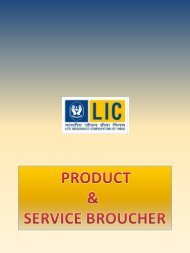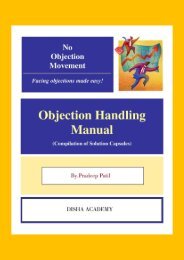Married Women Property Act-360 Degree Protection By.Pradeep Patil
We protect those things in people's lives that are precious beyond all calculation
We protect those things in people's lives that are precious beyond all calculation
You also want an ePaper? Increase the reach of your titles
YUMPU automatically turns print PDFs into web optimized ePapers that Google loves.
<strong>Women</strong>'s <strong>Property</strong> <strong>Act</strong> of 1882. Section 11 of that <strong>Act</strong> corresponding to Section 10 of the previous<br />
<strong>Act</strong> and Section 6 of our <strong>Act</strong> is as follows:<br />
A policy of assurance effected by any man on his own life, and expressed to be for the benefit of his<br />
wife, or of his children or of his wife and children, or any of them, or by any woman on her own life,<br />
and expressed to be for the benefit of her husband or of her children or her husband and children,<br />
or any of them., shall create a trust in favour of the objects therein named, and the moneys payable<br />
under any such policy shall not, so long as any object of the trust remains unperformed, form part of<br />
the estate of the insured, or be subject to his or her debts.<br />
5. It will be observed that in two particulars the terms of Section 11 of the <strong>Act</strong> of 1882 differ from the<br />
terms of Section 10 of the <strong>Act</strong> of 1870. The words "on the face of it" appearing in Section 10 are<br />
omitted in Section 11 of the later <strong>Act</strong> and for the words "shall...be deemed to be a trust" appearing in<br />
Section 10 of the <strong>Act</strong> of 1870 we have the words "shall create a trust in favour of the objects therein<br />
named, etc." in Section 11 of the <strong>Act</strong> of 1882.<br />
6. Relying on Section 6 of the <strong>Married</strong> <strong>Women</strong>'s <strong>Property</strong> <strong>Act</strong> of 1874 it is argued on behalf of the<br />
petitioner that by using the words that the sum is payable to "the assured or his wife Abhiramavalli if<br />
he predeceases her" it is expressed on the face of the policy that it is for the benefit of the wife of<br />
Srinivasa Aiyar if he predeceases her, and so, the policy "shall ensure" and "be deemed to be a<br />
trust for the benefit" of the petitioner within the meaning of that section. On the other hand, the<br />
argument of the respondents is that the words used in the policy are not specific enough to show<br />
that it is expressed on the face of it that it is for the benefit of his wife and that the policy shall<br />
ensure and be deemed to be a trust for her benefit within the meaning of the section. According to<br />
this argument, in order that a policy may be deemed to be a trust in favour of the wife within the<br />
meaning of Section 6 of the <strong>Act</strong>, it must appear on the face of the document in express words that<br />
the insurance was intended by the deceased for the benefit of his wife. I do not think that the<br />
language of Section 6 warrants the contention urged on behalf of the respondents. That section<br />
states that the policy shall on the face of it express that it is too he for the benefit of the wife and if it<br />
is so expressed, then it says the policy shall be deemed to be a trust for the benefit of the wife.<br />
There is nothing in the language of the section to show that the words "for the benefit of his wife" or<br />
other words corresponding to these should appear in the policy to enable us to infer a statutory trust<br />
in favour of the wife within the meaning of the section. If on reading the words used in the policy it<br />
appears that the assured has intended, in the event of his death that the policy should ensure to the<br />
benefit of his wife then I think the policy may be deemed to be a trust for her benefit. I shall now<br />
consider how far the authorities brought to my notice support the respective contentions.<br />
7. The only Indian decision bearing on the point occurs in Sriniivasachariar v. Ranganayaki Ammal<br />
(1926) 1 Ch.D. 48. In that case "R" insured his life in "S" Company and died in 1914. Under the<br />
terms of the policy the amount assured was payable to "R" or to his wife in case of his death earlier.<br />
It was held that the sum insured did not form part of the deceased's estate but that the Widow was<br />
the beneficiary who became entitled to the beneficial interest in that sum on her husband's death.<br />
The exact terms of. the policy making the amount payable to the wife, in the case of the husband's<br />
death do not appear in the judgment, but from the facts stated by the reporter it would appear that<br />
the terms were as general as the terms used in the present policy. This decision supports the<br />
petitioner. Another decision which supports the argument of the petitioner may be found in in, re<br />
Fleetwood's Policy (1926) 1 Ch.D. 48 a decision under the English <strong>Act</strong> of 1882. In that case a<br />
husband took but an insurance policy for £500 on his life and by the terms of the policy the<br />
insurance company agreed to pay that sum to the insured's wife, if she were living at his death, or in<br />
the event of her prior death to pay it to the insured's executors, administrators," and assigns. It was<br />
held that the policy came within Section 11 of the <strong>Married</strong> <strong>Women</strong>'s <strong>Property</strong> <strong>Act</strong>, 1882, and created<br />
a trust in favour of the wife in certain events. Though the words "for the benefit of his wife" did not<br />
appear in the terms of the policy, the learned Judge pointed out that "the policy is, in the terms of<br />
the section, a policy of assurance effected by a man on his own life, and expressed to be for the<br />
benefit of his wife." Using similar language, I. think we may say in this case that the language used<br />
in the policy "to the assured or his wife Abhiramavalli if he predeceases her" shows that it is a policy<br />
of assurance expressed to be for the benefit of his wife though the express words "for the benefit of<br />
his wife" do not appear in the terms of the policy. Mr. Duraiswami Aiyar for the respondents drew my<br />
attention to a series of cases under the English <strong>Act</strong> of 1870, the language of Section 11 of which, as<br />
I have already stated, is identical with that of Section 6 of the present <strong>Act</strong>. These cases are In re


















